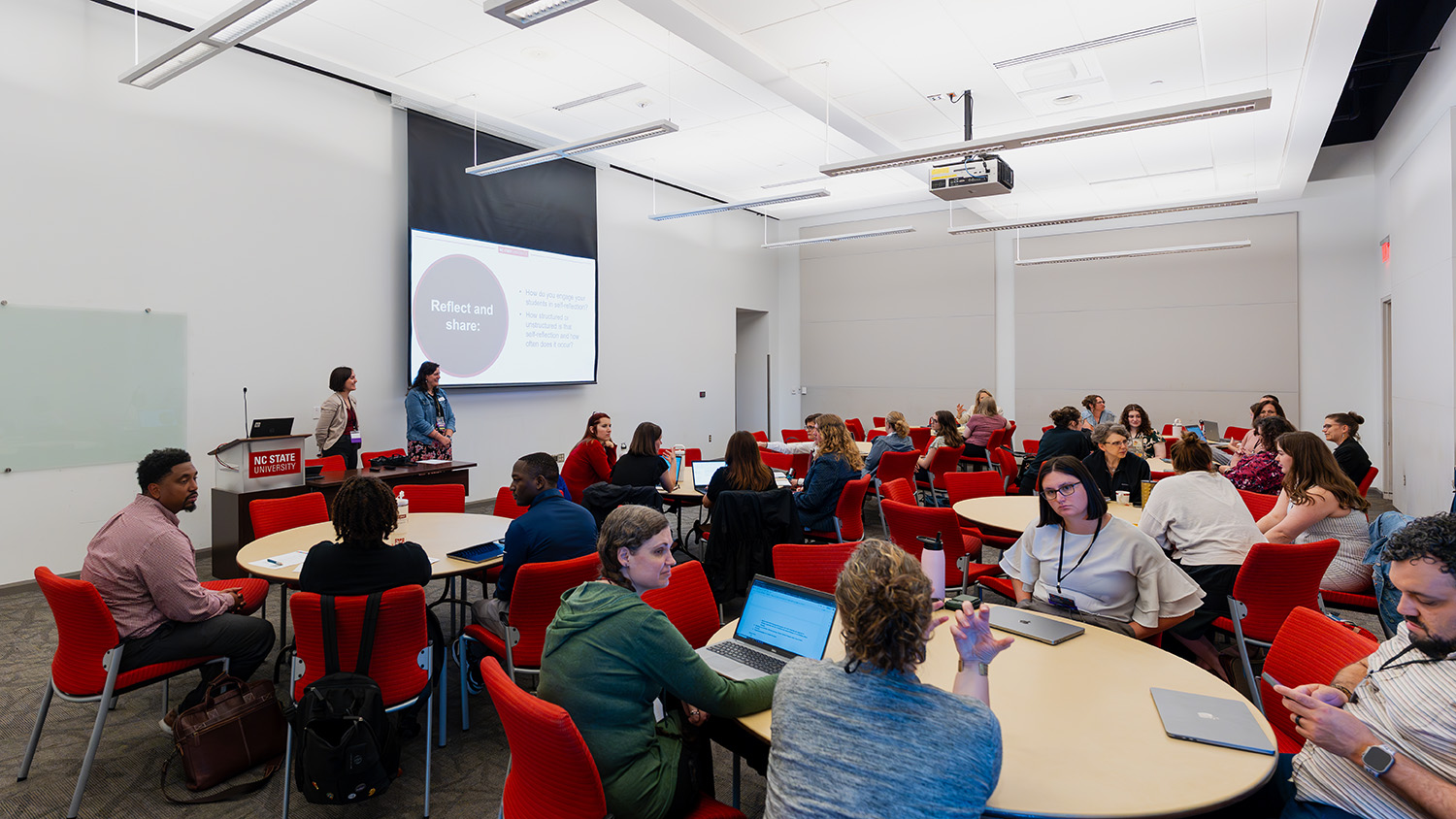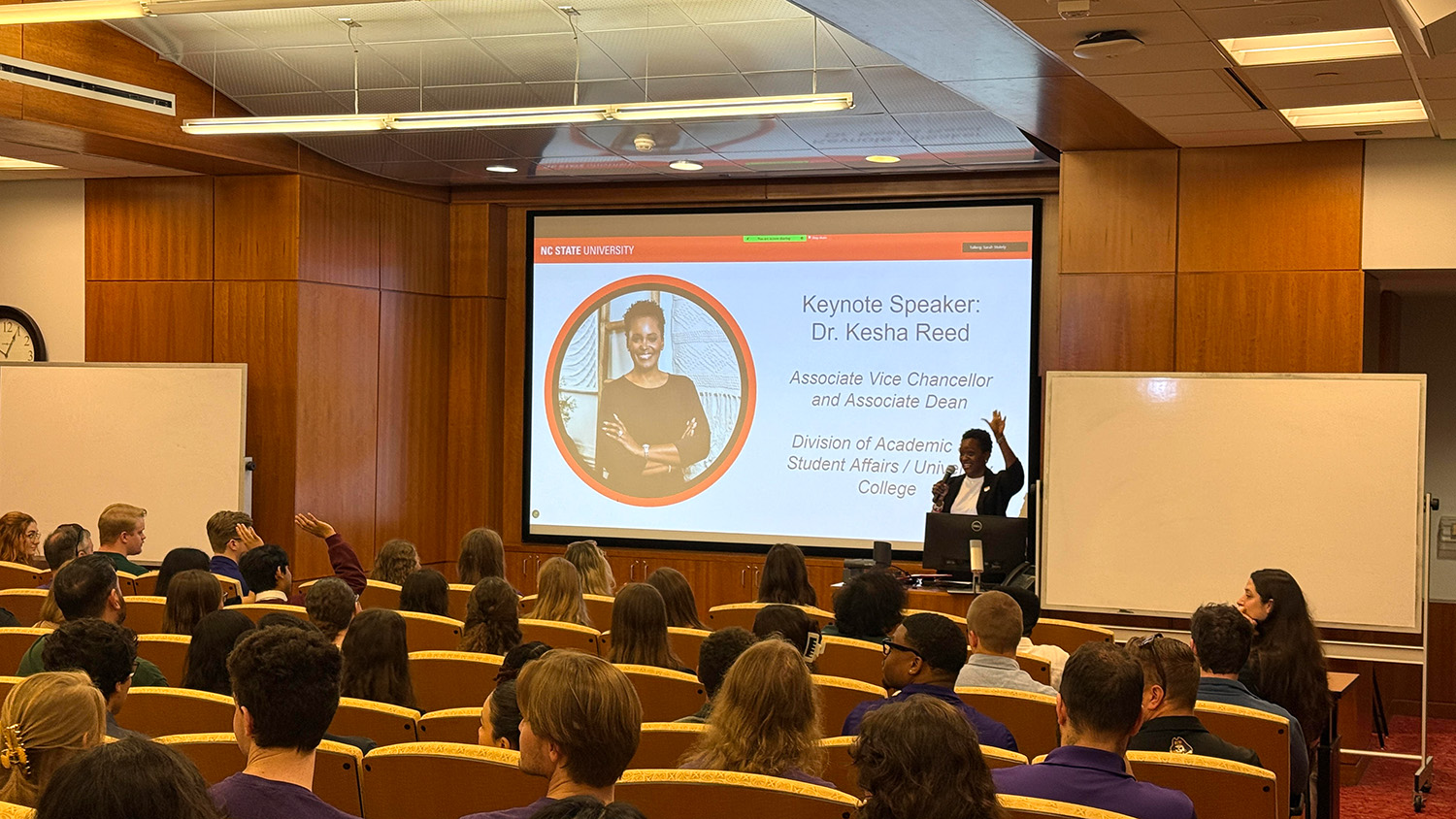University Honors Program Bestows Three Blanton Awards for Spring 2024
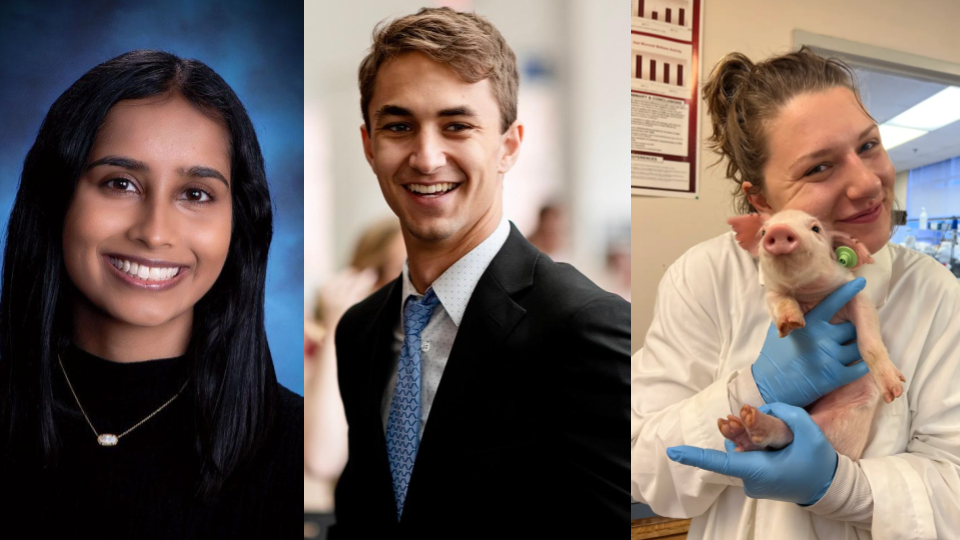
The University Honors Program (UHP) prides itself on encouraging students to make their undergraduate educational experience extraordinary by committing themselves to various academic and co-curricular opportunities, with a strong emphasis on undergraduate research.
The Honors Capstone Project, which has historically been a required component of the University Honors Program (until as recently as the incoming first-year admitted class in the fall of 2022), is one way that the UHP nudges students to challenge themselves in ways they may have never considered. Traditionally, the Honors Capstone has been a way to capture and publicly present a student’s signature research question or creative project, requiring up to six credit hours of dedicated independent research under the guidance of a faculty mentor.
The University Honors Program’s Richard L. Blanton Outstanding Capstone Award recognizes exceptional work by a University Honors Program student and encourages the highest levels of undergraduate scholarship and research at NC State. The award is meant to recognize individual students’ accomplishments and the development and execution of a dynamic Capstone project.
The award honors Dr. Richard L. Blanton, who served as the first director of the University Honors Program for 12 years. Dr. Blanton serves as a professor of plant and microbial biology and director of graduate programs for the College of Agriculture and Life Sciences.
This spring, the University Honors Program received a large number of highly competitive and thoughtful faculty mentor nominations for the Blanton Award. Ultimately, three graduates were recognized for their commitment to the research and scholarship mission of the University Honors Program.
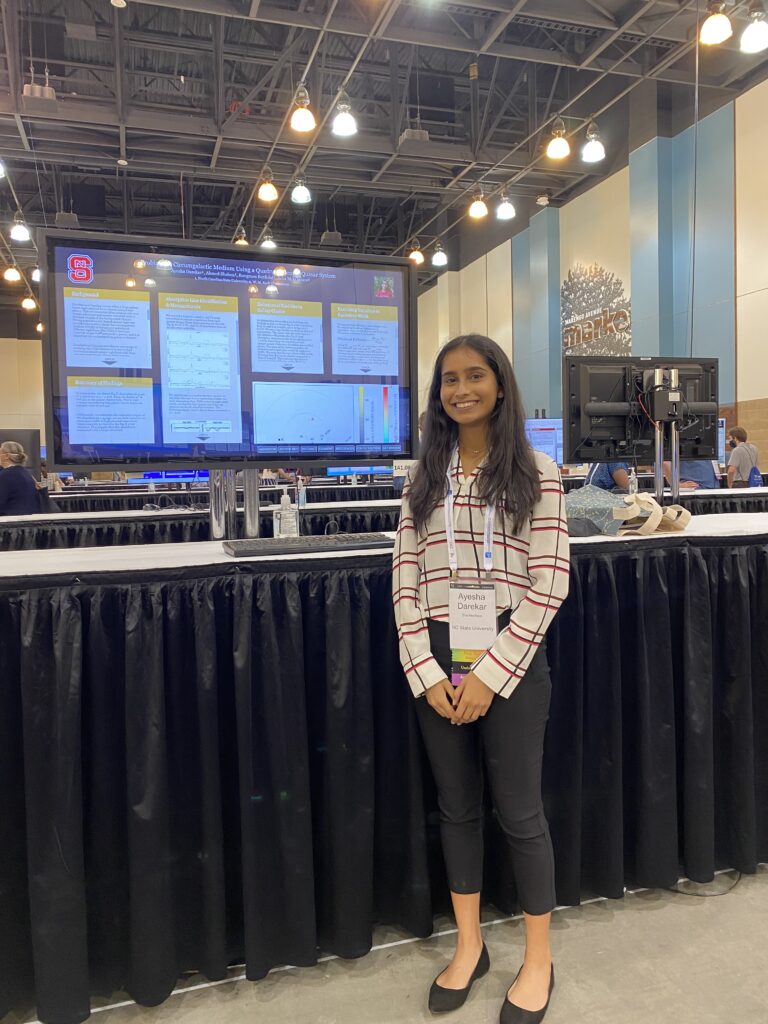
Ayesha Darekar double majored in physics and statistics and minored in mathematics. Darekar was nominated for the UHP’s Blanton Award by her faculty mentor, Rongmon Bordoloi, an assistant professor in the Department of Physics.
Bordoloi stated that “Ayesha has shown herself to be a motivated and skilled researcher. She demonstrated significant research independence in learning how to analyze astrophysical observations and how to use statistical tools to interpret the results. Her analysis yielded one of the few detections of cool circumgalactic gas in a galaxy cluster. This is a remarkable discovery that questions our understanding of how galaxy clusters (some of the largest gravitationally bound structures in the universe), grow their masses. She has already presented some of the initial results of this project at the 2021 McCormick undergraduate research symposium, where her poster was judged to be one of the best posters.”
About her mentor and his nomination, Darekar shared, “It’s amazing to know that someone I look up to and respect sees the significance of the research contributions I have made. I also feel honored that my mentor took the time to emphasize my research accomplishments. Working for Dr. Bordoloi has been an incredibly rewarding experience. His innate curiosity, patience and his way of explaining technical concepts in simpler terms are reasons why I consider him to be such a great and effective mentor. Dr. Bordoloi would always make me aware of opportunities and encourage me to pursue them. I am forever grateful for his support and encouragement.”
Darekar has had an interest in space and astronomy since middle school. Inspired by the vastness of the universe and the untapped wealth of information housed within, she is amazed by the idea that we can learn more about the far reaches of space simply by utilizing observations that can be made from instruments right here on Earth.
In her first semester at NC State, she took a one credit-hour physics class that brought in multiple professors to present and discuss their research with students. It exposed her to the different types of physics research that is conducted at NC State. Bordoloi, who ended up as her undergraduate research faculty mentor, was one of the professors who gave a presentation, and she immediately became fascinated with the galaxy research he works on. She took the initiative to set up a meeting with him in the weeks following and asked questions about his research, which resulted in a research position on his team.
To her peers, Darekar highly recommends getting involved with undergraduate research, “even if you may not want to pursue a research career. It’s a great way to become more knowledgeable about problems and questions that commonly come up in your field and ways to address them. Additionally, the skills you pick up as a researcher are transferable to a variety of careers.”
Undergraduate research allowed Darekar to practice multiple professional skills, including data and statistical analyses and programming. She will be moving to Seattle, WA this summer to join Boeing as an Associate Data Scientist in their Defense, Space and Security Division.
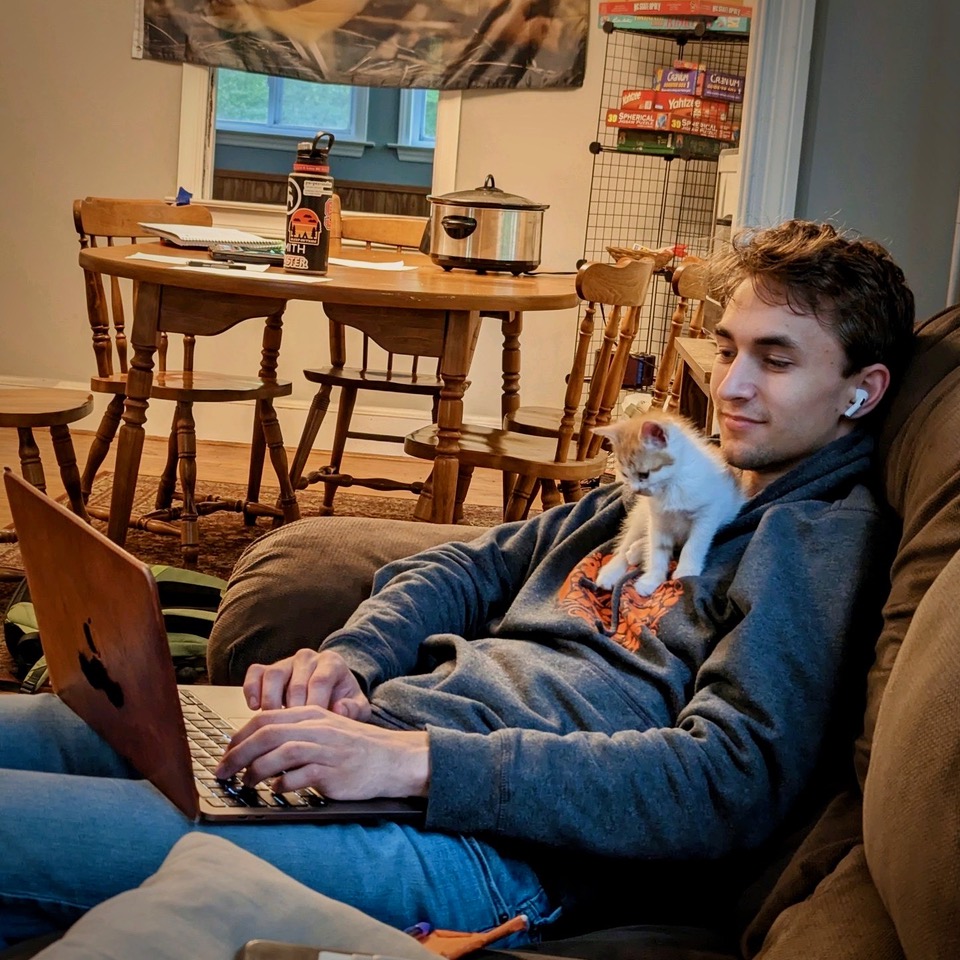
Jack Howard double majored in Computer Science and Physics and minored in Mathematics and is now continuing his education here at NC State, beginning his Master’s program in Computer Science.
For his undergraduate research, Howard focussed on writing software that acts as a middle-man between physicists and quantum computers. Using this software, physicists can describe the particular conditions of a system they want to model, and then leave it to the code to simulate the linear algebra of the quantum system or set up a connection to run the test live on a quantum computer.
“There are countless conditions a physicist may want to test, so our code takes advantage of software engineering techniques that let users connect their custom code to our system like a puzzle-piece, without having to write the whole program from scratch.”
The software allows physicists anywhere to learn more about systems they are curious about without having to dive too deep into the “quantum mechanical weeds” every time they want to run an experiment.
Reflecting on why he got involved with undergraduate research in the first place, Howard shared that working in this lab made him feel more genuinely like a physicist in a way that coursework simply can’t.
“I loved learning about different applications of the math I’d learned in my classes, including linear algebra and a ton of miscellaneous math topics that had me scribbling on whiteboards while perusing Wikipedia pages, math forums, and recent research papers. Those readings gave me the best idea of what cutting-edge research is usually like.”
Especially in a complex STEM major like Physics, it can at times be difficult for students to see what real-world applications might exist for their course material, since the classes cover such a broad spectrum of topics.
“This project was a delight because while it was guided by the ultimate need for a finished piece of software, the journey there was unpredictable and nonlinear,” Howard said.
“I think it’s funny when people try to make their research sound really fancy or professional when really anyone can do this. I’d much rather people think that they can do whatever I did after talking with me about my research than trying to make it sound super complicated.”
Howard enthusiastically recommends undergraduate research to anyone who wants to explore new topics. “In research–as in many areas of life–you don’t know what you don’t know, and figuring anything out at all is an enjoyable challenge.”
Howard’s faculty mentor, Alexander Kemper, associate professor in physics, wrote, “Jack is well on the way to being an excellent researcher, and already exhibits several traits and capabilities of such. He has confidence in his results and is capable of critically thinking about them. When faced with issues, he can resolve them himself.”
About Kemper’s Blanton Award nomination, Jack had this to share: “I can’t thank my mentor, Dr. Kemper, enough for his consistent help and guidance as I was navigating research for the first time. He and all of the graduate students in the Kemper Lab helped me so much by teaching me new physics, walking me through their ideas, and being friendly and welcoming without exception. Dr. Kemper’s words… reflect how fun, innovative, and dynamic the research process was, though difficult at times.”
As a result of the software that was developed through his research, Howard is now co-author of a publication that is under review at PRX Quantum. For Howard, however, the most rewarding aspect of research was also the most challenging.
“The process of exploration is given very little structure and very few rules. My favorite video games are the ones where they drop you into a puzzle–in media res–without any explanation of what to do, or why or how to do it. Research is like that, but with the universe as the game, and finding joy in the moments of small progress rather than big ‘Eureka!’ moments. Honestly, it’s often very frustrating and confusing in the thick of an unsolved problem. But you start to see the world in new ways as you learn the rules, and you can surprise yourself with how far you’ve come when you finally finish.”
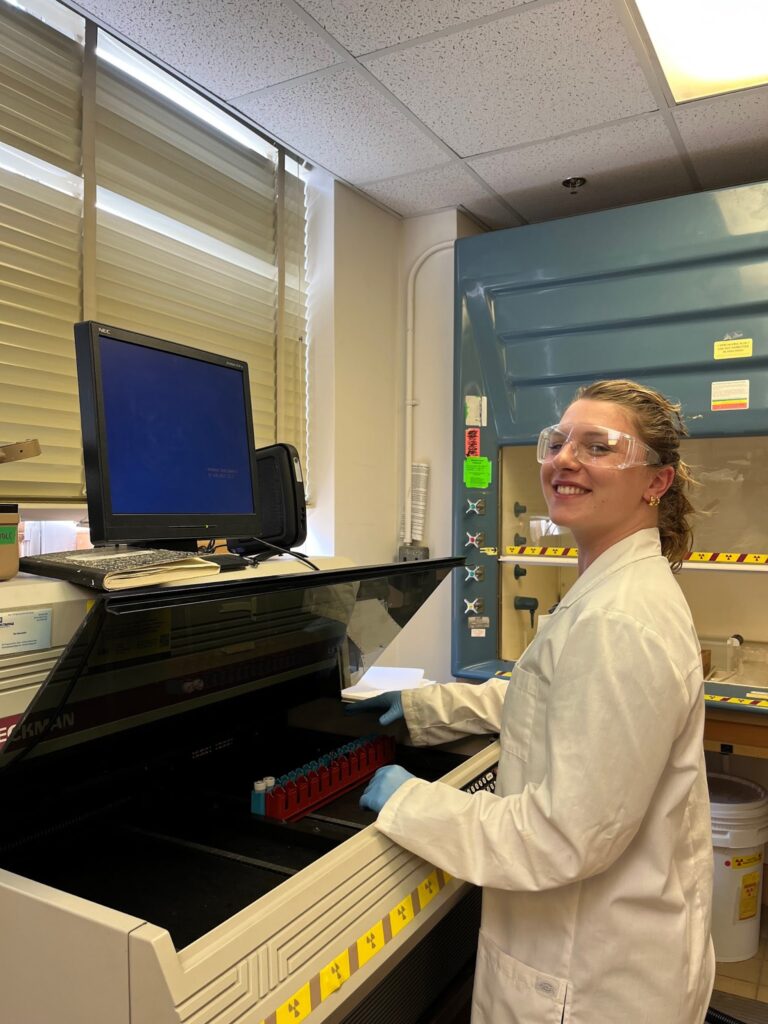
Paige Meisner majored in animal science with a minor in agricultural business. She credits the Honors Program with contributing to her interdisciplinary interests and connections. For example, Honors seminar courses, like WGS 330, “Women and Health,” allowed her to explore topics unrelated to her major, which helped spark her passion for medicine.
Meisner’s undergraduate research with Lin Xi, a research professor in nutritional biochemistry, focused on newborn piglet nutrition, specifically how they obtain energy from fat.
“Pre-weaning piglets have a very high mortality rate, costing the industry billions of dollars annually. Our findings have identified multiple treatments that successfully increase fat metabolism, and have opened the door for further examination into other target gene groups. This would impact both the swine industry, piglets especially, as well as newborn human babies, who suffer from similar issues related to fat utilization.”
Meisner says that she has always been interested in agri-medical research, or research that dually benefits both humans and animals, and swine serves as a great model for this. She was initially introduced to Xi’s lab through the NC State Animal Science Summer Undergraduate Research Experience internship program, and was immediately drawn to his research for its dual human-animal benefit model.
Meisner shared that the summer internship provided an excellent opportunity to explore the research being conducted in the Animal Science department, learn about research safety and ethics, and conduct independent research under faculty for an entire summer.
Xi nominated Meisner for a Blanton award because “Paige consistently displays an unquenchable thirst for knowledge and delivers spectacular results as a researcher… The results of Paige’s research will help us to understand the regulation of increasing milk fat utilization, and will be published in peer reviewed journals. She has a very balanced personality and has been very good at working with other students and visiting scientists. She is exceptionally nice and considerate. Paige has displayed excellent learning and cooperative ability as well as the competence of working independently.”
Paige says, “I was honored and touched to hear [Dr. Xi’s] words, and am deeply grateful he thought to nominate me. He’s an incredibly patient and knowledgeable scientist, who is always available and eager to help his students. He would often come to the lab to check in with the group, answer questions, and have a “party” (his word) with everyone.”
Meisner also highly recommends research to undergraduate students. “It teaches you so many useful skills and enables you to collaborate with incredible people. I think it is a beneficial experience no matter what your end career goals are.”
While Meisner admits that learning to balance her research with her personal life and maintaining good academic standing was a challenge at times, requiring a lot of planning and some sacrifice, the benefits far outweighed the costs. The most valuable thing Meisner says that she gained from her undergraduate research experience was the people. “Being surrounded by so many intelligent and motivated people helps drive self-motivation so much, and the connections I have made helped open so many more doors for me along the way and continue to do so.”
Meisner will be attending the University of Maryland College Park in the fall to begin work on her Master of Science in Animal Science, where she will focus on different aspects of poultry reproduction and genomics.
- Categories:
